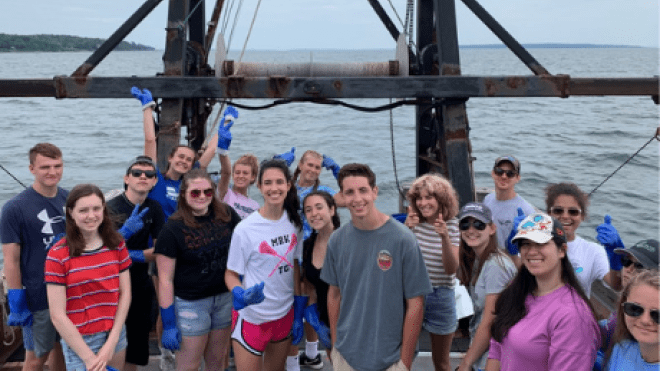High Schoolers Explore the Bay in Marine Biology Camp
In July, the Marine Biology program at RWU hosted a camp for high school students to learn about the program, do research on the bay and get a sense for life on campus.

BRISTOL, R.I. – There is no view quite like the one from the top of Mount Hope Bridge. Now, instead of driving a car across the bridge, imagine kayaking right below it.
From July 14- 20, local high school students spent their days and nights diving into marine science. As soon-to-be college students spent time on campus, they were exposed to a variety of field and laboratory activities where they were able to, literally, get their hands wet and get a feel for a potential career in marine science. The purpose of this camp is to help future college students, interested in marine biology, decide whether or not this is the field they wish to pursue in their college career and beyond.
Since 1989, high school students have been coming to RWU each summer to experience a bit of college life. Joe and Maria Szczebak, directors of the Marine Biology Summer camp, share their love for marine science in hopes that these upcoming college students will pursue the same.
Each summer, two students from the marine science program work as RA camp counselors where they live in the dorms with the campers for the week. These counselors are responsible for the campers when the directors are home for the night and help with researching activities along with field trips throughout the week.
However, each day is entirely different from the previous.
“Some days everyone is on the boat while other days are spent in the lab or at the beach,” said Joe Szczebak. This summer, the campers spent the first week on Roger’s new research vessel, taking water samples from the bay. The campers were able to measure the nutrient and oxygen levels from different depths. One day the campers went to University of Rhode Island (URI) to use their research vessel, where they dragged a net across the bay floor, pulling up many different types of fish and crustaceans.
"This is the longest sampling survey in the United States and potentially even the world, operating once a week, year-round to document community structure as well as ID local fish,” said Szczebak.
The campers are involved with a variety of common lab and field sampling techniques often used in the marine science career including, including water quality sampling, plankton tows, identifying local marine species and sampling fish and invertebrates using an otter trawl and beach seine. Students also have the opportunity to explore the bay ecosystems by kayaking, snorkeling and whale watching.
Not only are there hands-on activities provided by the camp, but campers also have the chance to sit in on lectures that relate to their camp activities. The lectures are provided by campus faculty and offer a sense of college life here at RWU.
After getting to know the bay through important research and exciting marine-based activities, many campers apply to RWU for college and choose to major in Marine Biology. Having had exposure to the marine science curriculum and faculty, along with a taste of college life, these students are well-prepared for the exciting path ahead.